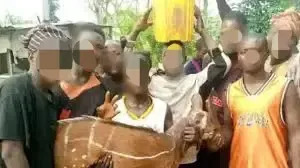What unfolded in Uromi, the administrative hub of Esan North East Local Government Area in Edo State, on Thursday, March 27, was a grim culmination of months of anguish, fear, and simmering resentment. The rising wave of kidnappings and brutal attacks attributed to suspected criminal herders had pushed many communities in Edo and indeed other parts of the South-South to a breaking point.
Over two dozen communities across Edo Central, North, and South senatorial districts have been devastated or remain under siege by herdsmen believed to have migrated from northern Nigeria. A similar crisis has engulfed over 30 communities in Delta and Bayelsa States, where rampant invasions of farmland, sexual assaults, and hostage-taking have become frighteningly routine.
A Tipping Point
The situation in Uromi had long been deteriorating. Just months ago, women marched in protest to the palace of the Onojie of Uromi, decrying the escalating abductions and killings. In January, the Onojie of Uzea, HRH Solomon Itoya Iluobe, openly banned the presence of Fulani herders in the forests surrounding his domain, recounting how he had paid ransoms multiple times including for his own sister.
Amid this backdrop of chaos and lawlessness, a group of 27 men of Hausa origin claiming to be hunters traveling from Port Harcourt to northern Nigeria for the Salah celebrations found themselves at the center of a fatal confrontation.
Hunters or Criminals?
Reports indicate that the group was intercepted by local vigilantes after a tip-off about suspicious activity involving arms being loaded onto a Dangote-branded trailer. At a checkpoint in Ubiaja, the trailer refused to stop for local security and was later forced to a halt in Uromi, where the situation escalated violently.
According to multiple eyewitnesses, one of the passengers allegedly stabbed a vigilante member during questioning. Enraged, a mob descended, setting fire to the truck and killing 16 people. Only five are said to have escaped.
Survivors maintained they were licensed hunters carrying traditional Dane guns and accompanied by dogs. But many locals remained unconvinced.
Eyewitness Accounts: What Sparked the Lynching
Ben, a long-time resident of Uromi, condemned the jungle justice but insisted the victims had aroused suspicion by hiding in a trailer filled with palm kernel shells, covered with tarpaulin. “Hunters usually move openly. Why conceal themselves if their intentions were genuine?” he asked.
Prince Eugene Olumese and others echoed this skepticism, pointing to the presence of large sums of new currency notes and lack of hunting evidence like game meat.
Survivors Identified by Past Victims
Perhaps the most chilling claim was that some villagers who had previously been kidnapped identified several of the intercepted men as their former captors. One source revealed that some of the items found in the truck matched belongings stolen during past abductions.
“Why would hunters not carry dried meat or other signs of their trade? Instead, they had bags of rice, money, and weapons,” the source said. “Their presence was traced to a hideout in the forests between Onicha-Ugbo and Ubiaja, long known as a hotspot for criminal activity.”
Rising Tensions and Institutional Breakdown
A week before the attack, five alleged kidnappers were arrested in the forests and transferred to Benin City. They were released days later, sparking outrage among the vigilantes who had risked their lives capturing them. In another incident, a woman who went to pay ransom for her sister’s release was taken captive, and her sister was released instead.
Tragic stories abound. A newborn baby was reportedly fed to dogs by herders while the mother, held captive, watched in horror. In another case, a three-year-old child was trampled to death by cows.
Fallout and Political Reaction
Edo State Governor Monday Okpebholo visited Uromi the day after the incident. Clashes nearly erupted between protesting Hausa residents and local women demanding renewed security. The protests reignited anger over the dissolution of the Edo State Security Network (ESSN), a local vigilante initiative disbanded by the current administration.
Okpebholo’s government has since taken a hard stance, demolishing properties linked to suspected kidnappers and vowing a continued crackdown.
However, critics argue that the absence of an effective and trusted security network, coupled with widespread impunity, created the conditions for such tragic mob justice.







































0 Comments